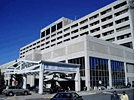Privacy & Security
Ottawa Hospital hit with ransomware, four computers locked
March 23, 2016

OTTAWA – Four computers of The Ottawa Hospital’s network of 9,800 devices were temporarily frozen by ransomware, which encrypted the information on the machines and made it inaccessible to hospital administrators.
The hospital wouldn’t disclose what was on the machines that were infected, the Ottawa Citizen newspaper reported. Spokeswoman Kate Eggins said the machines were wiped clean of the infection and the information on the computers was restored through the use of backup copies of the data.
“No patient information was affected. The malware locked down the files and the hospital responded by wiping the drives,” said Eggins. “We are confident we have appropriate safeguards in place to protect patient information and continue to look for ways to increase security. We would like to reiterate that no patient information was obtained through the attempt.”
The incident demonstrates the importance of having an effective backup system and the ability to combat computer malware and intrusions.
The dangers of ransomware has come to the fore, after the much-publicized attack on the Hollywood Presbyterian Medical Center, in Los Angeles, Calif. Earlier this year, ransomware froze the computer systems of the hospital, which responded by paying nearly US$17,000 in Bitcoins to unencrypt the systems.
Ransomware is a virus that enters an organization by tricking a computer user to install malicious software on a personal or work computer. The dangerous software usually comes in the form of a spam email, which is being sent in the form of an invoice, a website or video.
When the computer user opens the attachment, the software then gets to work encrypting all the data on the user’s computer. By encrypting the data, it locks out the user, making the data inaccessible to the computer user.
In order to regain access to the files on the computer, the user is forced to pay a ransom. The ransom is usually requested in Bitcoins, which cannot be traced. However, there is no guarantee that paying the ransom will see the data on the machine unlocked.
Computer security company McAfee has named ransomware as one of the biggest security threats of 2016. It’s one that will affect consumers and businesses equally as the criminals behind the malicious software don’t care who the virus infects as long as people are paying ransoms. According to McAfee, there were more than four million samples of ransomware floating around on the Internet last year, and more than 1.2 million of those samples were new.
